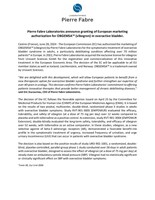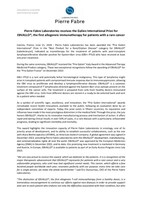CASTRES, France, Dec. 10, 2021 /PRNewswire/ -- Today, the final findings of the CONTROL study1 were presented at the 2021 San Antonio Breast Cancer Symposium (SABCS). Results suggest that providing a prophylactic anti-diarrhoea medical treatment or applying a dose escalation schedule of neratinib associated with loperamide (as necessary) at treatment initiation over two-weeks reduces the incidence, severity, and duration of neratinib-associated grade 3 diarrhoea.
The CONTROL study was committed upon the results of the ExteNET pivotal study2, in which no mandatory anti-diarrhoea therapy was administered and where grade ≥3 diarrhoea was observed in nearly 40% of patients and 17% of patients discontinued the study for this specific reason.
The CONTROL study (n= 563) was designed to investigate six prophylaxis options for the prevention of neratinib associated diarrhoea. Final results presented at SABCS determined that adoption of neratinib dose escalation in association with loperamide (as necessary) during the first two-weeks of treatment (DE1 cohort) was associated with the lowest rate of grade 3 diarrhoea during the trial compared with all other investigated anti-diarrheal strategies. At least 75% of patients received neratinib longer than 11.06 months in the DE1 cohort, compared with 7.46 months in the DE2 cohort, which comprised of patients taking neratinib over a 4-week escalation and loperamide (as necessary). The DE1 cohort also reported the lowest rate of diarrhoea-related discontinuations (3.3%) and dose holds (11.7%).
Deborah Szafir, Executive Vice President, Medical & Patient Consumer Department Director said, "The CONTROL study has showed that neratinib associated diarrhoea can be managed with proactive prophylaxis and dose escalation strategies. These results provide useful information to the scientific community about neratinib safety profile and its management. This is an important outcome as we know that, despite the advances offered by the many anti-HER2 agents available for early breast cancer treatment, up to 25% of HER2+ patients will still experience a recurrence of the disease at 10 years."
The CONTROL study final results were submitted to the European Medicines Agency in order to align the Product Information with the current scientific knowledge.
REFERENCES
1 Abstract P5-18-02 - Chan A. Final findings from the CONTROL trial of diarrheal prophylaxis or neratinib dose escalation on neratinib-associated diarrhea and tolerability in patients with HER2+ early-stage breast cancer – 2021 SABCS, Poster Session 5, Friday, Dec. 10, 7:00-8:30 a.m. CT
2 Chan A, Delaloge S, Holmes FA, et al. Neratinib after trastuzumab-based adjuvant therapy in patients with HER2-positive breast cancer (ExteNET): a multicentre, randomised, double-blind, placebo-controlled, phase 3 trial. Lancet Oncol. 2016;17:367e377.
NOTES TO EDITOR
About CONTROL - NCT02400476
The CONTROL trial is sponsored by Puma Biotechnology, Inc.. It is an international, multi-cohort, open-label, phase 2 study designed to investigate 6 preventive antidiarrheal prophylaxis options with loperamide for the prevention of neratinib associated diarrhoea. Adult patients (563) with stage I–IIIc HER2+ breast cancer who had completed trastuzumab-based adjuvant therapy within 1-year prior to study entry received oral neratinib (240 mg/day for 1 year).
The patients were enrolled sequentially into six separate cohorts:
- Mandatory loperamide prophylaxis.
- Budesonide + loperamide.
- Colestipol + loperamide.
- Colestipol + loperamide pro re nata (PRN).
- Neratinib DE1 (2-week escalation) + loperamide (PRN, as necessary).
- Neratinib DE2 (4-week escalation) + loperamide (PRN, as necessary).
About ExteNET - NCT00878709
ExteNET was a multicentre, randomised, double-blind, placebo-controlled phase III trial. Patients with HER2+ eBC received oral neratinib 240 mg/day or placebo for 12 months after trastuzumab-based (neo)adjuvant therapy. The ExteNET trial met its primary endpoint and demonstrated improved invasive disease-free survival (iDFS) with NERLYNX, compared with placebo in patients with HER2+ eBC. The greater and more durable efficacy was observed in the subgroup with HR+ disease who initiated treatment within one year of completing trastuzumab, referred to as the HR+/≤ 1 year population, leading to the EMA label population.
About NERLYNX®
NERLYNX® (neratinib) is a type of targeted therapy for breast cancer called an irreversible pan-HER inhibitor (it inhibits HER1, HER2 & HER4). It is a once daily oral tablets treatment approved in Europe to treat adults with early-stage human epidermal growth factor receptor 2 positive (HER2+) and hormone receptor positive (HR+) breast cancer who have previously been treated with trastuzumab-based therapy within less than 1 year.
Neratinib works blocking the HER2 receptors on the surface of breast cancer cells from receiving growth signals and helps to stop the cancer from spreading.
NERLYNX® is a registered trademark of Puma Biotechnology, Inc. Puma in-licenses the global development and commercialization rights to PB272 (neratinib, oral), PB272 (neratinib, intravenous) and PB357.
Puma granted Pierre Fabre exclusive rights to develop and commercialize NERLYNX within Europe, Turkey, Middle East, Africa and Greater China.
For further information, please visit the Pierre Fabre website at www.pierre-fabre.com, @PierreFabre
Contact Pierre Fabre
Anne Kerveillant
anne.kerveillant@pierre-fabre.com
Logo: https://mma.prnewswire.com/media/1328780/Pierre_Fabre_Logo.jpg







Share this article